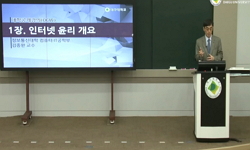In recent years, several efforts to combat threats posed in cyberspace have been made globally and states have been increasing their efforts to prepare for future cyber attack. In this regard, this article examine how to address cyber security issues ...
http://chineseinput.net/에서 pinyin(병음)방식으로 중국어를 변환할 수 있습니다.
변환된 중국어를 복사하여 사용하시면 됩니다.
- 中文 을 입력하시려면 zhongwen을 입력하시고 space를누르시면됩니다.
- 北京 을 입력하시려면 beijing을 입력하시고 space를 누르시면 됩니다.
https://www.riss.kr/link?id=A89502391
- 저자
- 발행기관
- 학술지명
- 권호사항
-
발행연도
2012
-
작성언어
Korean
- 주제어
-
KDC
360
-
등재정보
KCI등재
-
자료형태
학술저널
-
수록면
795-822(28쪽)
-
KCI 피인용횟수
5
- 제공처
-
0
상세조회 -
0
다운로드
부가정보
다국어 초록 (Multilingual Abstract)
In recent years, several efforts to combat threats posed in cyberspace have been made globally and states have been increasing their efforts to prepare for future cyber attack. In this regard, this article examine how to address cyber security issues throughout introduction of international legal regimes. There is a broad range of hostile or malicious action in cyberspace such as cyber war, cyber espionage and cyber crime. Imprecision in terminology hampers serious discussion of these issues. Part I examines how these blurring concept of cyber conflicts can be clarified to derive legal countermeasures against concurrent phenomenon. Cyber war can be defined as the use of force to cause damage, destruction or casualties for military purpose targeting an opponent state. Provided that cyber war using cyber weapons constitutes international armed conflict, principles of the U.N. Charter and International Humanitarian Law are applicable to cyber war. Regarding protection of private and civilian facilities which does not fall within the scope of military objective, international cooperation system must be implemented for cyber security throughout introduction of related international organizations. Contrary to the cyber war, cyber espionage is difficult to be regulated by international norms. Although it may be interpreted as electronic preparation of battlefield, it is neither plausible to investigate all of the spy action nor apply the law of armed conflict. Cyber crime, intended cyber attack by individuals, is technically differentiated with cyber war. The identity of those who engage in these crimes, however, can be indeterminate, and these activities overlap with cyber war at some extent. Part II explore into several cyber security strategy, especially one of the U.S., Lo create and secure international agenda for cyber defense. This part first examines whether cyber deterrence strategy would work based on a state`s public discussion. The paper further analyze the blue print of the international treaty on the use of cyber weapons reflecting fundamental characters of cyber threats. The author finally derive the necessity of international agreements to prohibit cyber attacks towards civilian and non-governmental facilities.
참고문헌 (Reference)
1 김흥석, "사이버 테러와 국가안보" (121) : 2010
2 McAfee, "Virtual Criminology Report 2009, Virtually Here: The Age of Cyber Warfare"
3 The White House, "The White House Progress Report, Cybersecurity Progress after President Obama’s Address"
4 Nathan Thornburgh, "The Invasion of the Chinese Cyber-spies"
5 The White House, "The Comprehensive National Cybersecurity Initiative"
6 William A. Owens, "Technology, Policy, Law, and Ethics Regarding U.S. Acquisition and Use of Cyberattack Capabilities"
7 John Bumgarner, "Overview by the US-CCU of the Cyber Campaign Against Georgia in August of 2008"
8 Carl von Clausewitz, "On War" Princeton University 1984
9 Caroline McCarthy, T.J, "Maxx probe finds broader hacking"
10 Macon Phillips, "Introducing the New Cybersecurity Coordinator"
1 김흥석, "사이버 테러와 국가안보" (121) : 2010
2 McAfee, "Virtual Criminology Report 2009, Virtually Here: The Age of Cyber Warfare"
3 The White House, "The White House Progress Report, Cybersecurity Progress after President Obama’s Address"
4 Nathan Thornburgh, "The Invasion of the Chinese Cyber-spies"
5 The White House, "The Comprehensive National Cybersecurity Initiative"
6 William A. Owens, "Technology, Policy, Law, and Ethics Regarding U.S. Acquisition and Use of Cyberattack Capabilities"
7 John Bumgarner, "Overview by the US-CCU of the Cyber Campaign Against Georgia in August of 2008"
8 Carl von Clausewitz, "On War" Princeton University 1984
9 Caroline McCarthy, T.J, "Maxx probe finds broader hacking"
10 Macon Phillips, "Introducing the New Cybersecurity Coordinator"
11 Dmitri Alperovitch, "Fighting Russian Cybercrime Mobsters: Report from the Trenches" 2009
12 The White House, "Cyberspace Policy Review: Assuring a Trusted and Resilient Information and Communications Infrastructure"
13 Government Accountability Office, "Cybersecurity: Continued Efforts Are Needed to Protect Information Systems from Evolving Threats" 2009
14 Richard A. Clarke, "Cyber War: The Next Threat to National Security and What to Do About It" Ecco Press 2010
동일학술지(권/호) 다른 논문
-
한미 FTA 투자자-국가 중재의 주요 쟁점에 관한 연구
- 안암법학회
- 오현석 ( Hyun Suk Oh )
- 2012
- KCI등재
-
- 안암법학회
- 최한준 ( Han Jun Choi )
- 2012
- KCI등재
-
- 안암법학회
- 한철
- 2012
- KCI등재
-
공무원의 정치적 기본권 -보장 범위의 확대화 그 전제조건-
- 안암법학회
- 장영수 ( Young Soo Jang )
- 2012
- KCI등재
분석정보
인용정보 인용지수 설명보기
학술지 이력
| 연월일 | 이력구분 | 이력상세 | 등재구분 |
|---|---|---|---|
| 2024 | 평가예정 | 재인증평가 신청대상 (재인증) | |
| 2021-01-01 | 평가 | 등재학술지 선정 (계속평가) |  |
| 2019-01-01 | 평가 | 등재후보학술지 선정 (신규평가) |  |
| 2018-12-01 | 평가 | 등재후보 탈락 (계속평가) | |
| 2017-12-01 | 평가 | 등재후보로 하락 (계속평가) |  |
| 2013-01-01 | 평가 | 등재학술지 유지 (등재유지) |  |
| 2010-01-01 | 평가 | 등재학술지 선정 (등재후보2차) |  |
| 2009-01-01 | 평가 | 등재후보 1차 PASS (등재후보1차) |  |
| 2008-01-01 | 평가 | 등재후보학술지 유지 (등재후보1차) |  |
| 2006-01-01 | 평가 | 등재후보학술지 선정 (신규평가) |  |
학술지 인용정보
| 기준연도 | WOS-KCI 통합IF(2년) | KCIF(2년) | KCIF(3년) |
|---|---|---|---|
| 2016 | 0.75 | 0.75 | 0.74 |
| KCIF(4년) | KCIF(5년) | 중심성지수(3년) | 즉시성지수 |
| 0.7 | 0.7 | 0.827 | 0.44 |




 KCI
KCI KISS
KISS






